Items
Tag is exactly
Oregon
-
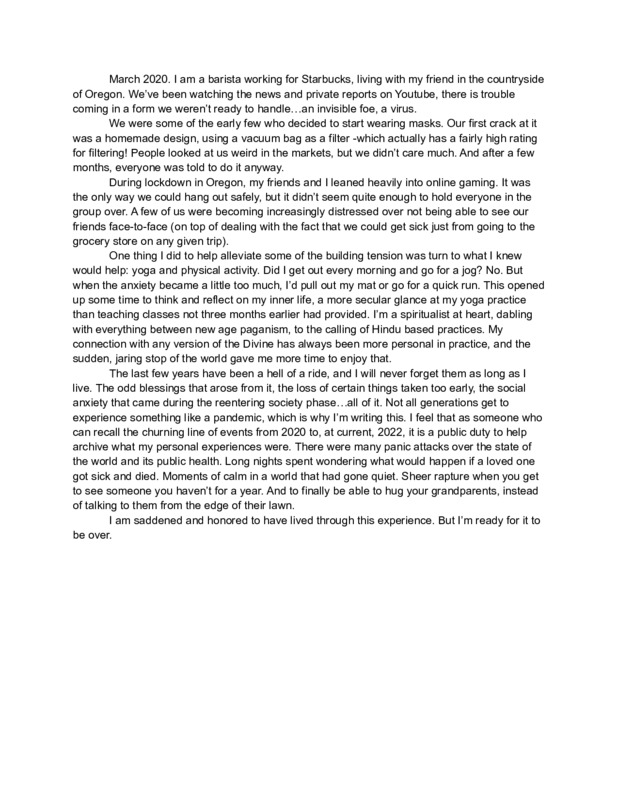 2022-04-25
2022-04-25A Wild Ride
In a world wide pandemic, it is important to get first hand accounts and feelings to be able to look into later. -
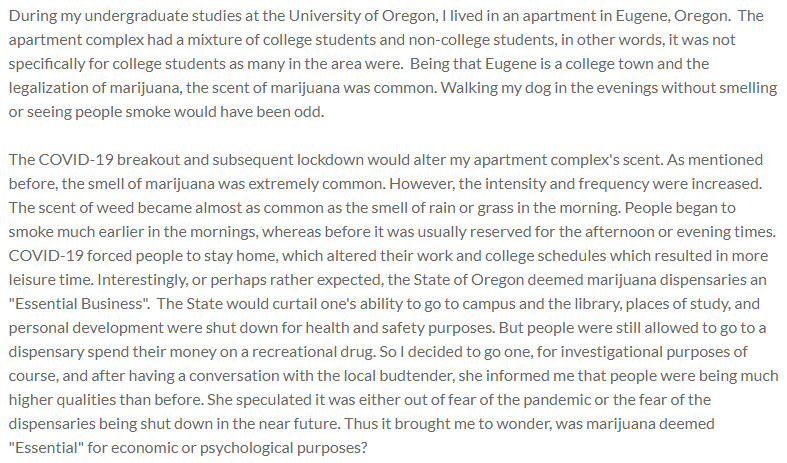 2020-02-01
2020-02-01Essential Business
During my undergraduate studies at the University of Oregon, I lived in an apartment in Eugene, Oregon. The apartment complex had a mixture of college students and non-college students, in other words, it was not specifically for college students as many in the area were. Being that Eugene is a college town and the legalization of marijuana, the scent of marijuana was common. Walking my dog in the evenings without smelling or seeing people smoke would have been odd. The COVID-19 breakout and subsequent lockdown would alter my apartment complex's scent. As mentioned before, the smell of marijuana was extremely common. However, the intensity and frequency were increased. The scent of weed became almost as common as the smell of rain or grass in the morning. People began to smoke much earlier in the mornings, whereas before it was usually reserved for the afternoon or evening times. COVID-19 forced people to stay home, which altered their work and college schedules which resulted in more leisure time. Interestingly, or perhaps rather expected, the State of Oregon deemed marijuana dispensaries an "Essential Business". The State would curtail one's ability to go to campus and the library, places of study, and personal development were shut down for health and safety purposes. But people were still allowed to go to a dispensary spend their money on a recreational drug. So I decided to go one, for investigational purposes of course, and after having a conversation with the local budtender, she informed me that people were being much higher qualities than before. She speculated it was either out of fear of the pandemic or the fear of the dispensaries being shut down in the near future. Thus it brought me to wonder, was marijuana deemed "Essential" for economic or psychological purposes? -
2021-10-06
The Desperate Cling
When the pandemic hit the small town I resided in March of 2019, the aftershock evoked a hopelessness that was unexpected. Growing up learning “stop, drop, and roll,” I presumed catching on fire was going to be much more problematic than pathetic trauma that has consumed my generation. In seventh grade, my school spent the day watching planes hit the towers on 9/11. Then that night watching the strength of my single mother dwindle while recording the news on VHS tapes. I believed my resilience created from the past had prepared me to get through this pandemic. I was much less resilient than I had anticipated. I worked as a barista in a grocery store and had seen the hatefulness and treatment this once friendly town provided. Before moving to this small town I would visit in the summer and found it difficult to understand how perfect strangers could treat each other like lifelong neighbors. The cloud that had fallen upon this town was shocking. 6am when the grocery doors opened I would watch what seemed to be half the town race with carts, baskets and bags to the designated “hot spots.” (Toilet paper, rice, beans, and bread) I watched as my co-workers were interrogated by their neighbors over product. My coffee kiosk was quiet compared to what it had been and that gave me time to observe the change in demeanor from my co-workers as well. The emotional exhaustion of their own fears along with half of the town coming in to dump their fears and baggage onto them as well; The physical exhaustion of working 60-70 days, pushing product and covering shifts. It was a mad house. It was hard to see the toll on such a warm and friendly town. Customers, co-workers, strangers would indulge dark, inappropriate and ugly opinions I had never expected, especially not in this sleepy town. I could feel the darkness and fear of other steeping into myself. It became difficult to be patient and interact with others. By the end of the day I would be so emotionally spent from pushing myself to be a courteous light for a beacon of all that sadness. I was bitter for this, finding it difficult to cling to my hope in humanity. I wasn’t anticipating this type of reaction from society when faced with such a colossal disaster like the world had reacted after 9/11. So in a way, I think I was resilient to the events but I was unprepared for the worlds reaction. -
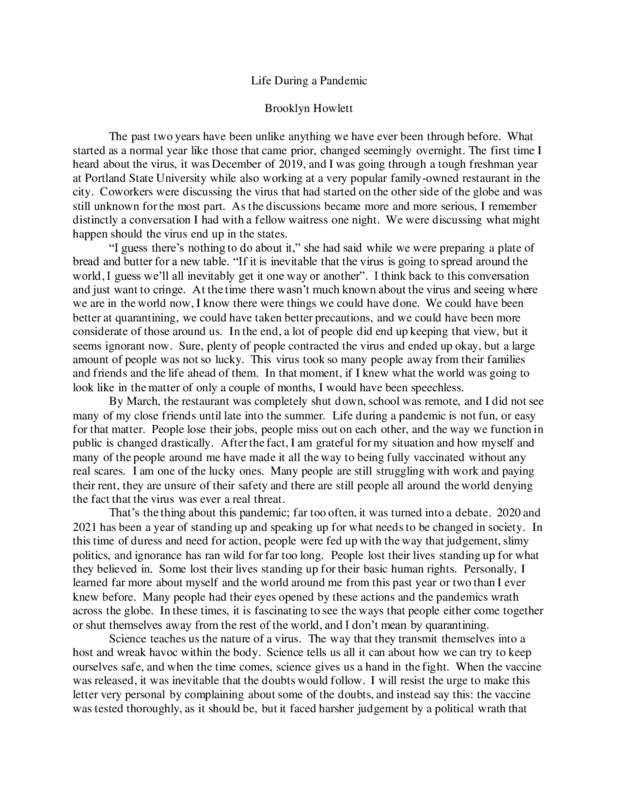 2021-10-05
2021-10-05Life During a Pandemic
This is a brief look into life during the pandemic and how society has changed as well as what I have learned about the world and myself throughout the last two years. This is important to me because history is a great way to learn more about where we are today, if I am able to contribute to giving an insight to future generations about how our lives were affected by the global pandemic, I would be happy to do so. -
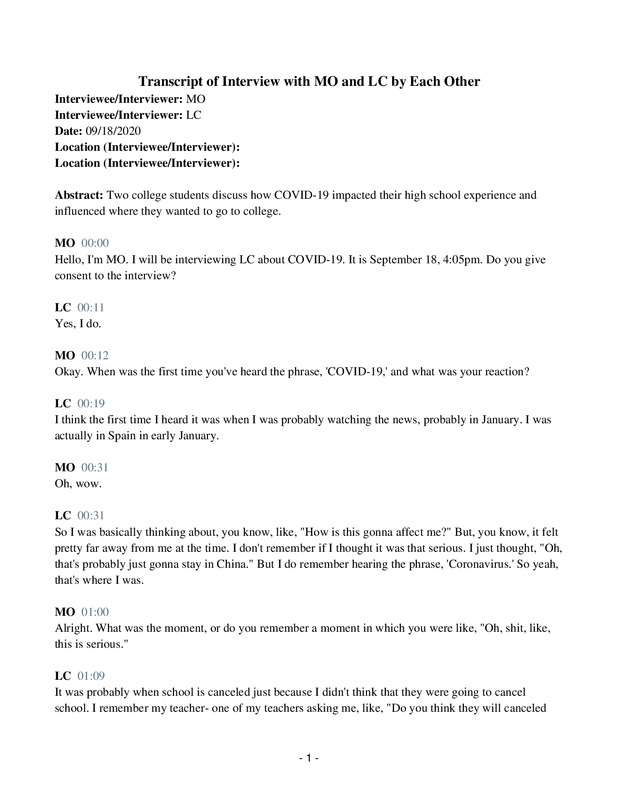 2020-09-18
2020-09-18MO and LC Oral History, 2021/09/18
Basic interviews between two college students looking back on the start of the pandemic. -
 2021-09-04
2021-09-04hermit HERALD, ISSUE 127
Taliban need outside help -
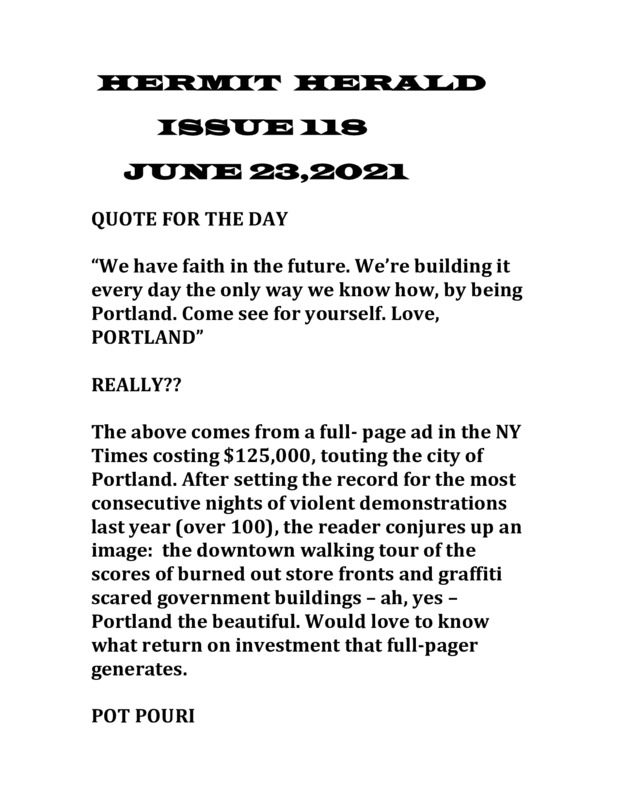 2021-06-23
2021-06-23HERMIT HERALD, ISSUE 118
Portland promotion -
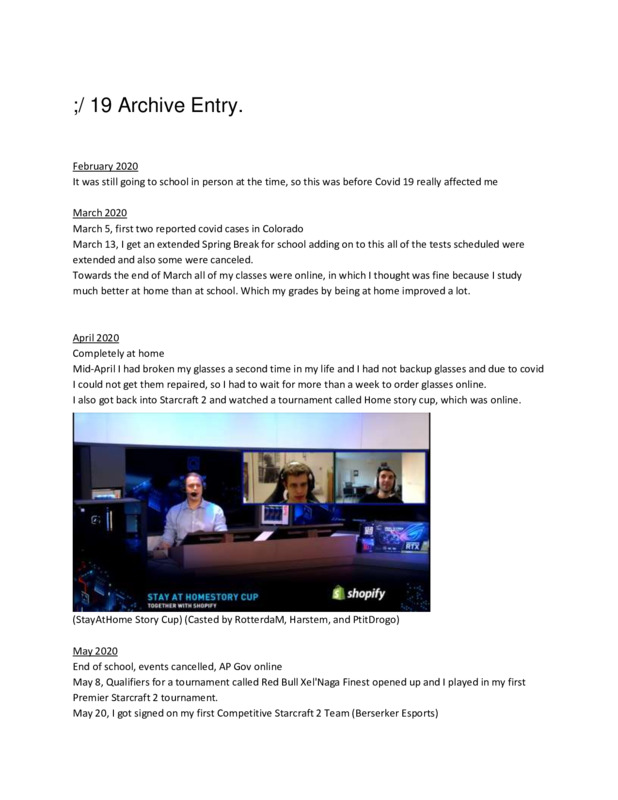 2021-05-25
2021-05-25Covid 19 archive entry (Starcraft Edition)
What this mainly shares my experience with my esports team during the pandemic and also how my social life changed during the pandemic. The object is to talk about how I made new friends and also how Covid 19 wasn't the only world wide issue, and example would be the crisis in Myanmar. -
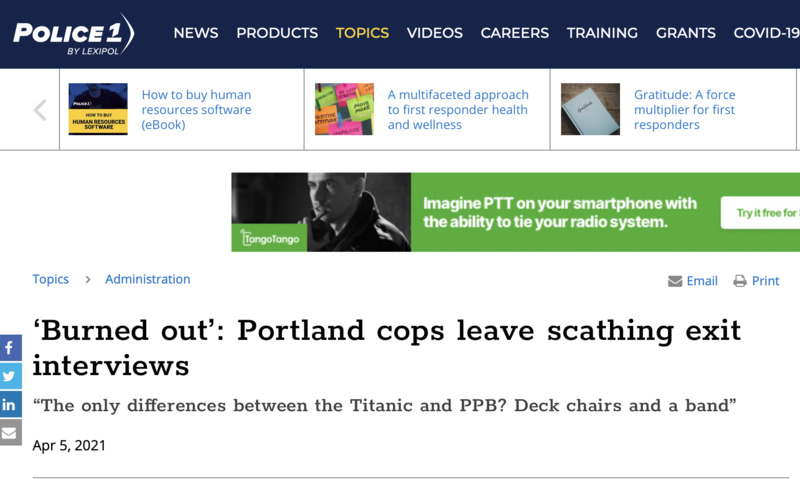 2021-04-05
2021-04-05Online Article: ‘Burned out’: Portland cops leave scathing exit interviews
This article from Oregon Live/The Oregonian was picked up by Police1, and it discusses a number of exit interviews that retiring and resigning Portland Police Bureau officers, detectives, and administrators left during the past year. Of particular interest is the section that discusses the story of Jaykary Jackson: "Young officers of color have left, including Jaykary Jackson, who went to Boise, and Elise Temple, who was one of the Police Bureau’s recruiters. Temple declined to comment on the record. Jackson didn’t respond to messages but he was one of the officers who spoke out last summer about being on the front line of racial justice protests as an officer with the Rapid Response Team. A graduate of Portland State University who joined the Police Bureau after working for Nike for 10 years, he said then that he became a cop because he “wanted to make the most out of my life by helping others.” He also was following in the footsteps of his father and aunt. But Jackson said he was disgusted by the hatred he and other officers faced while standing on the police lines. He got hit by an explosive one night, felt tingling in his fingertips and heat from the device, and got berated by young white protesters. Often when he tried to talk to someone of color at the protests, he said, “Someone white comes up and blocks them and tells them not to talk.” Or yells, “Eff the police ... don’t talk to him.” He left shortly after he was named to be a new community engagement officer." The article illustrates the additional concerns that officers in major cities and law enforcement agencies face, especially when their civilian oversight overwhelmingly seeks to placate protests with emotional vindication in lieu of reasoned, rational, and planned reforms. -
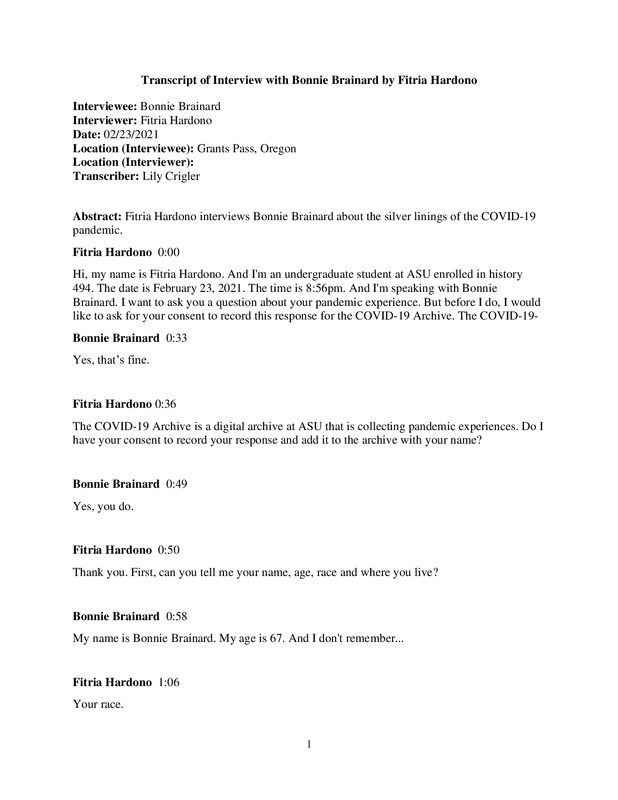 02/23/2021
02/23/2021Bonnie Brainard Oral History, 2021/02/23
I recorded a mini oral history with my former professor Dr. Beverly Van Note. -
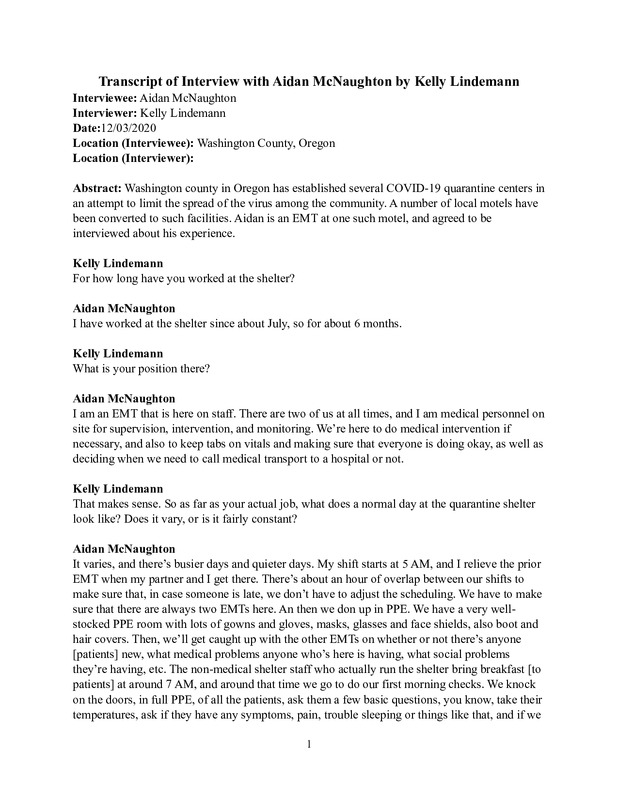 12/03/2020
12/03/2020Aidan McNaughton Oral History, 2020/12/03
Washington county in Oregon has established several COVID-19 quarantine centers in an attempt to limit the spread of the virus among the community. A number of local motels have been converted to such facilities. Aidan is an EMT at one such motel, and agreed to be interviewed about his experience. -
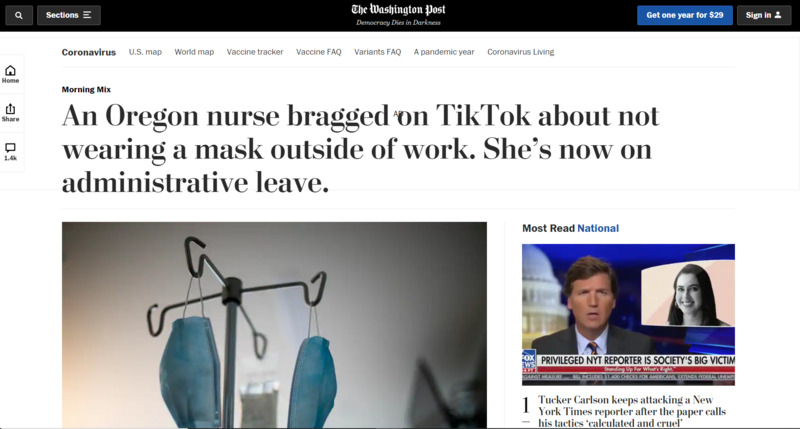 2020-11-27
2020-11-27she doesn't believe in the pandemic
The nurse Ashley Grames was put on administrative leave because she did not follow any guidelines from her work and even said she let her children go places like to others houses with no precaution. -
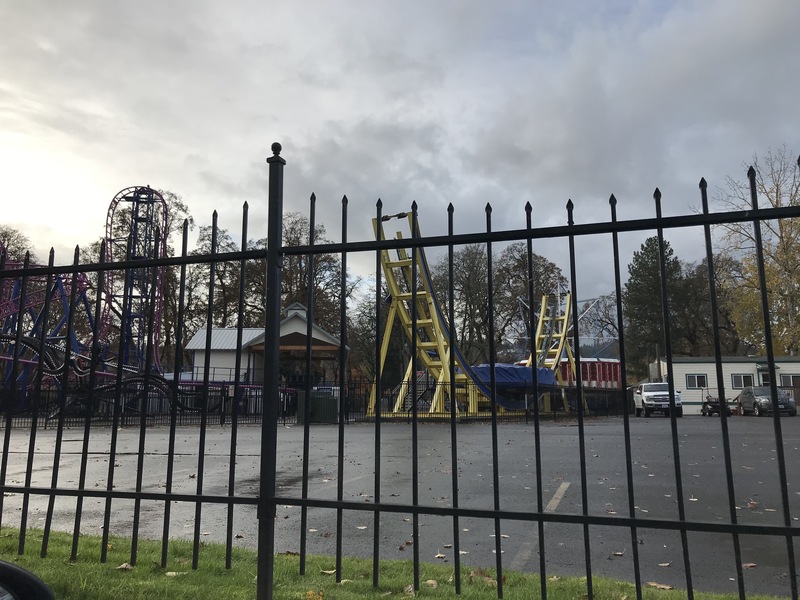 2020-11-24
2020-11-24Empty Oaks Amusement Park
Oaks Amusement Park in Portland, Oregon has been closed for the 2020 season, and looks eerie and empty. It looks abandoned and gives off mega haunted Scooby Doo type vibes. The park petitioned Governor Kate Brown for permission to reopen, but have not received permission as of November 2020. -
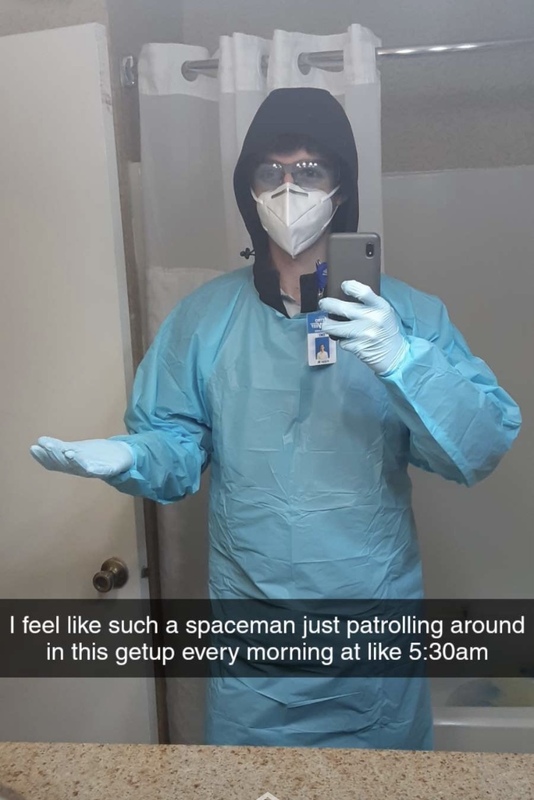 2020-10-23
2020-10-23Voluntary Isolation Motel EMT
Several counties across Oregon have coordinated with local motels to establish voluntary isolation shelters in an attempt to curb the spread of COVID-19. Each location is staffed with city personnel to manage admittance and discharge, while EMTs on staff conduct routine medical monitoring to patients. My boyfriend works in one of these shelters, and sent me this picture of him in his full PPE getup before making morning rounds. The shelter's capacity varies a lot week by week, and anywhere from 1-20 COVID positive patients may be staying there at any given point. This particular motel intakes prisoners who need to do a 2 week quarantine before being released, but also serves non-incarcerated people who have tested positive. -
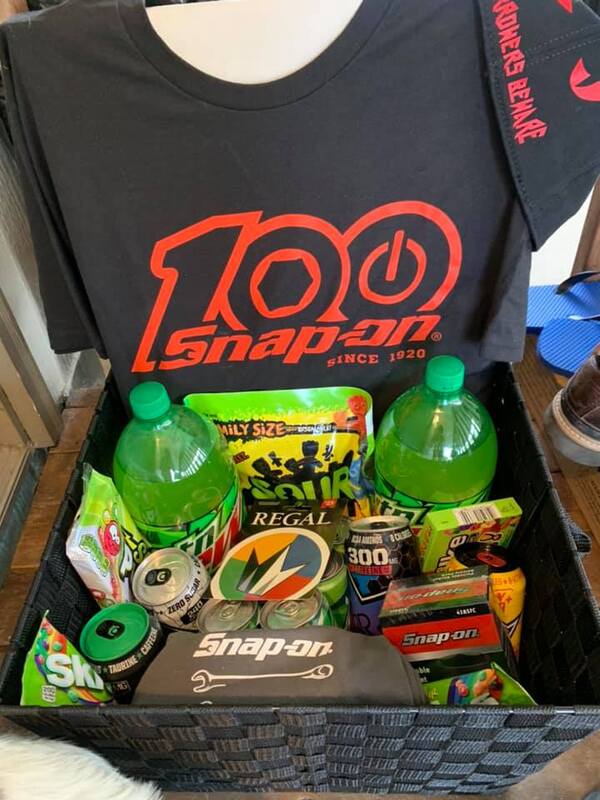 2020-11-06
2020-11-06Adopt a Senior 2020
In my hometown of Corvallis Oregon, after March 13th the class of 2020 never entered the doors of our high schools again. Anything we left in our lockers and classrooms was put in garbage bags and handed to us from 6 feet away. Our graduation ceremony was a parade of cars through the backroads of my hometown. A mother at my high school decided this wasn’t fair, we needed to have another type of celebration. Mealoha McFadden created a facebook group to “adopt” 2020 seniors in our county and shower them with gifts and praise. Many people got their favorite candies, snacks and others got starter kits for college. In my adoption care package, I got a tool set for my dorm, lots of candy, my favorite soda and a note praising my accomplishment. Although times were especially hard in my hometown, there was a glimmer of happiness when a senior got their gifts. -
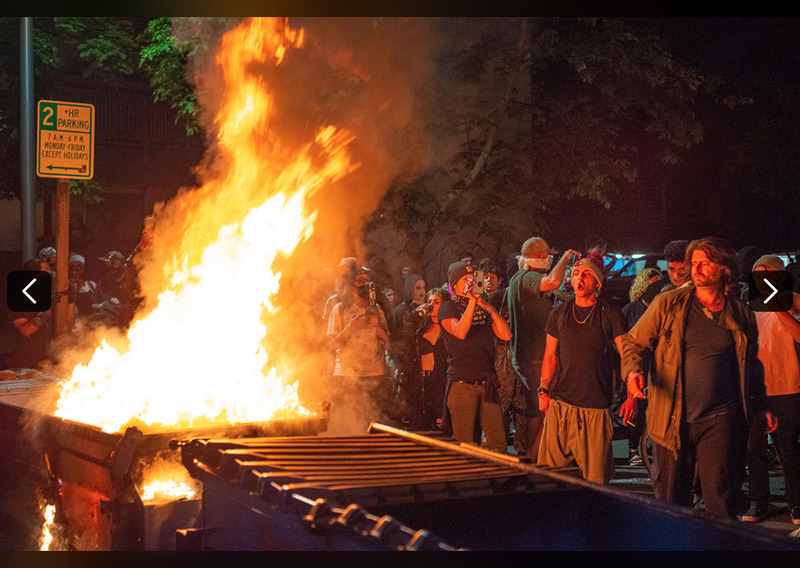 2020-05-29
2020-05-29Rioting in the streets of Eugene, Oregon
On May 29th, 2020, a strip mall in Eugene, OR was vandalized by protestors of George Floyd’s death. -
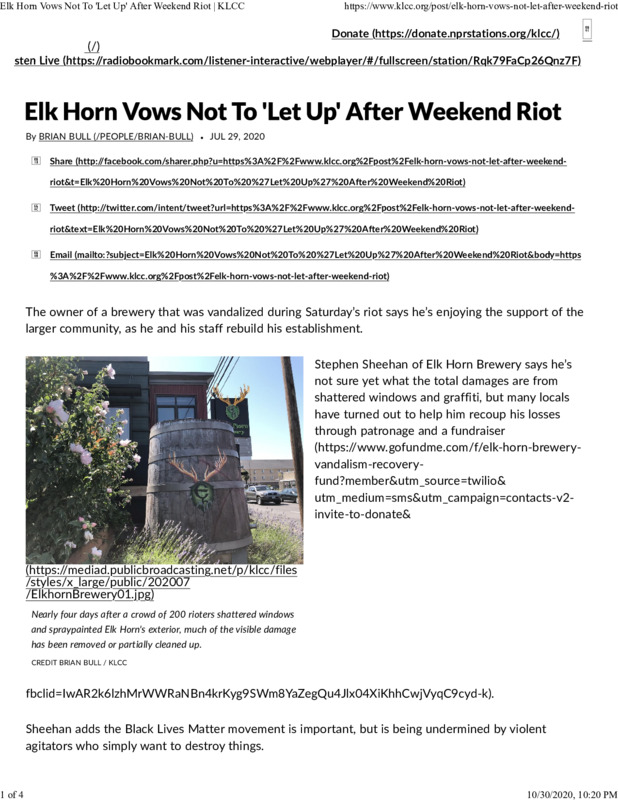 2020-07-29
2020-07-29Elk Horn Vows Not To 'Let Up' After Weekend Riot
A restaurant in Eugene, Oregon, was vandalized during the initial protests over the death of George Floyd. The damage was in excess of $500,000. The restaurant owner claims that the Black Lives Matter movement is being undermined by violent agitators. The owner has been criticized in the past for anti-homeless views. -
 2020-09-09
2020-09-09Smoke over the Pacific Northwest
Flying from Portland to San Francisco on September 9th, the skies below were visibly smoky. It was hard to distinguish normal fog from smoke from the fires, but two huge plumes of smoke can be seen in the time-lapse. The air smelled like smoke when I took off from Portland, but was much worse in San Francisco- the sky was orange and visibility was greatly reduced. -
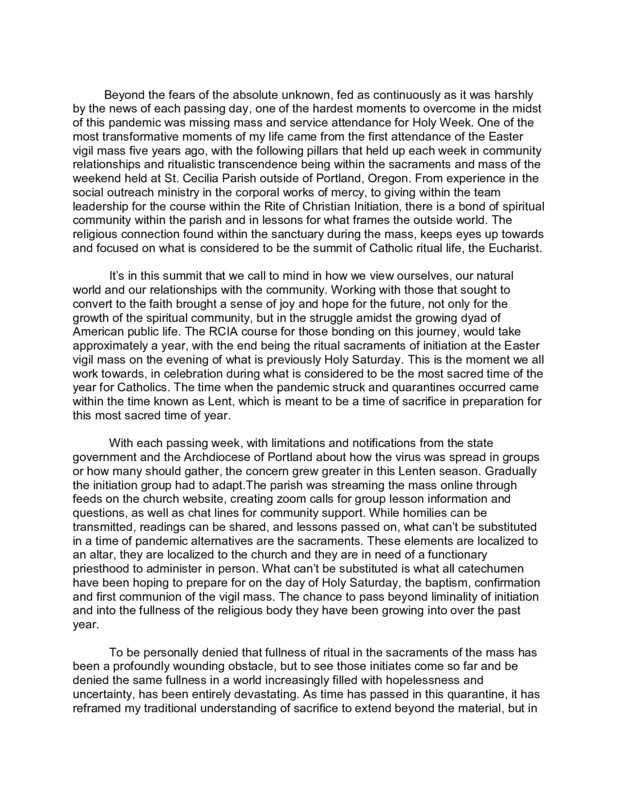 2020-08-11
2020-08-11Holy Saturday
This is a story about the quarantine separating me, and most importantly others in my community, from participating not only in the sacrifice of the mass but also catechumens from receiving the sacraments of initiation during Holy Week. It's the most sacred time of the year for Catholics. It marks not only the anniversary of a deeply changing experience for me, but it's the time when I can see candidates enter the body of the church fully, and for that body to either be baptized or renew their baptismal vows. -
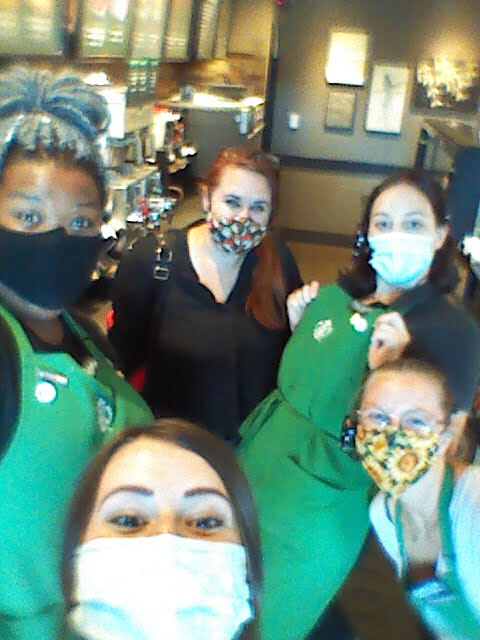 2020-08-10
2020-08-10Corona and Coffee
I'm a barista at Starbucks coffee company. It's been a disturbing and fascinating few months, to say the least, and like most, I've experienced some significant changes to my work and personal life. Most notably, my job is now my bubble. When the quarantine orders went out in Oregon, Starbucks kept going. I had two weeks of mandatory self-isolation after one of my work crew came into possible contact with COVID early in the pandemic. Otherwise, I've been working more than ever before. Interacting with the public makes me constantly on edge. But the coffee industry seems to have been deemed "essential," and my team and I are kept busy supporting the public's caffeine addiction through the global madness that has been 2020. Because of my hundreds of interactions with strangers daily, I've cut off almost all contact with my friends and family outside of work. The risks of my coming into contact with the virus are high, especially when not all of our customers feel inclined to comply with COVID-19 regulations. I'm happy to have my job and not have experienced the economic uncertainty that so many have dealt with in recent months. Despite the loneliness of feeling removed from my family and friends, this pandemic has brought my work team closer together. We have all experienced the pandemic the same way and become a support system for each other for which I feel lucky. -
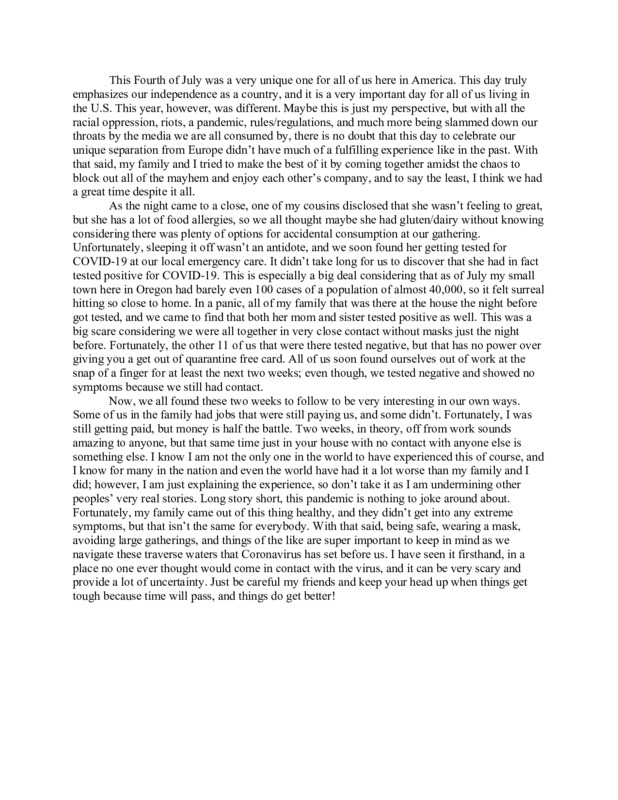 2020-07-04
2020-07-04COVID-19 Family Quarantine
It shows the impact of this virus on my family's lives as well as my own. I feel my experience is one story to the many that can provide context on the interesting times we live in. -
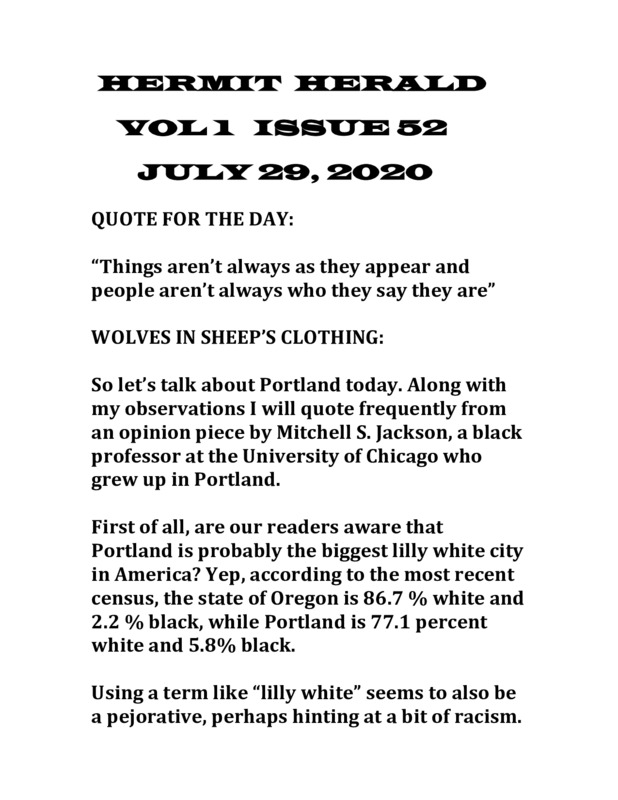 2020-07-29
2020-07-29HERMIT HERALD VOL 1 ISSUE 52
Portland, Oregon riots -
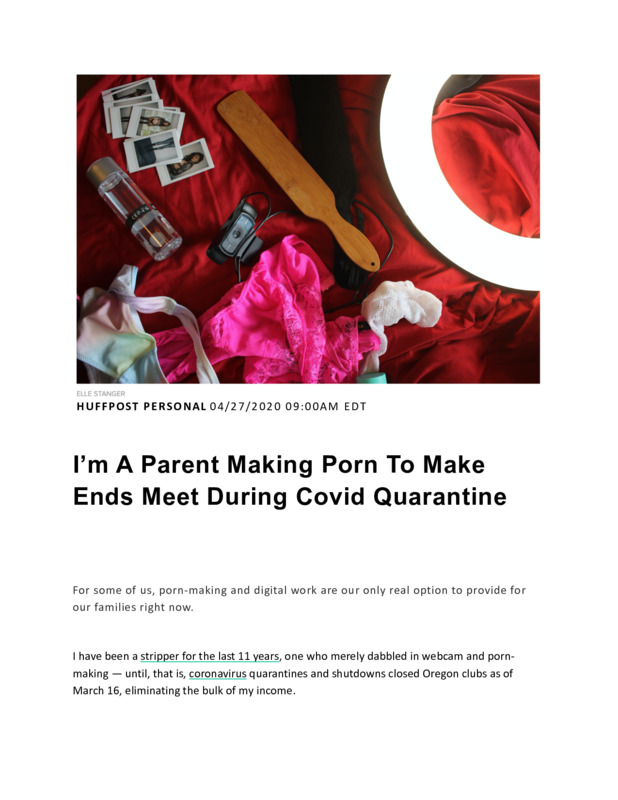 2020-04-27
2020-04-27I'm in Porn to Make Ends Meet During COVID
This is an article about a mother who was a stripper before the clubs had to close due to COVID laws. Now she is using porn to pay her bills while in quarantine. She does webcam work along with sexting and other things. She has an 8 year old daughter and discusses how she explains her work to her. She is conflicted about what other people think of her activities, her difficulty taking money becuase the usual venues don't accept sext trade payments, how to get social media followers, how privacy acts are affecting her, and the benefit of porn to people who partake in it. She ends with "Porn is literally saving many people's lives during quarantine." -
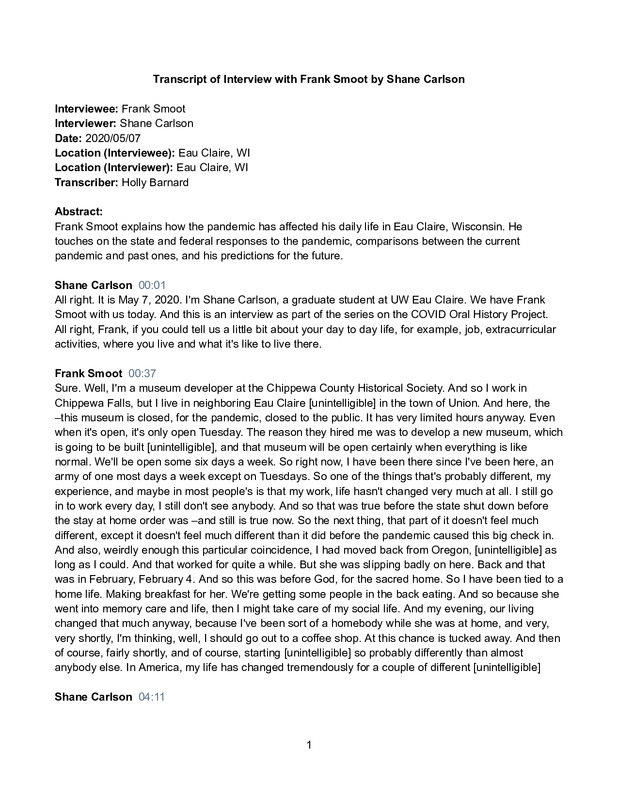 05/07/2020
05/07/2020Frank Smoot Oral History, 2020/05/07
-
 2020-06-15
2020-06-15Gov. Brown asks for release of some prison inmates to slow virus spread
One of the hardest hit populations with regards to covid-19 are corrections facilities. In an effort to slow the spread in the nations overcrowded facilities government officials have released some inmates early. The public has had mixed reactions to this policy. While the government officials are not releasing inmates that pose a danger to the public people are still worried. This article covers the story in Oregon and the comments add to the conversation. -
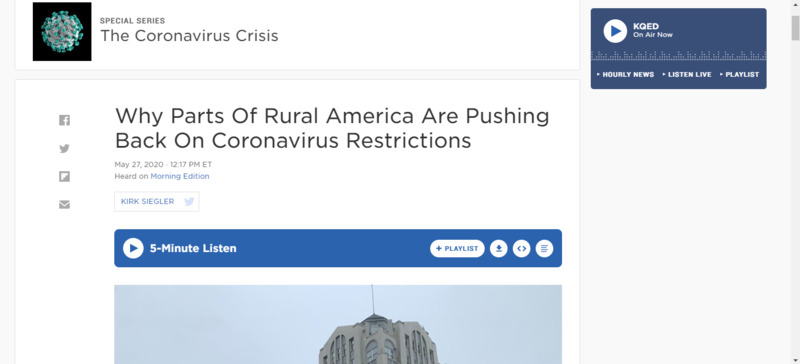 2020-05-27
2020-05-27Push Back in Rural America
Podcast about the push-back by rural Americans against restrictions. -
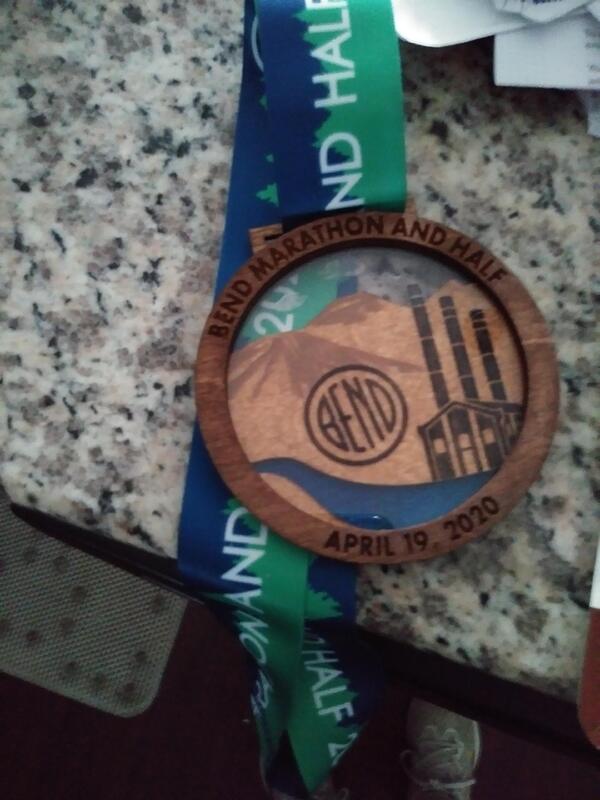 2020-05-26
2020-05-26Social Distancing Half Marathon
I was supposed to attend the Bend Half Marathon last April in Oregon, until the COVID-19 pandemic canceled the event. The Bend Half Marathon decided to host a virtual half marathon. It sent me a Social Distance Edition Half Marathon run bib. After I submitted my run results, the marathon mailed me a wooden medal. -
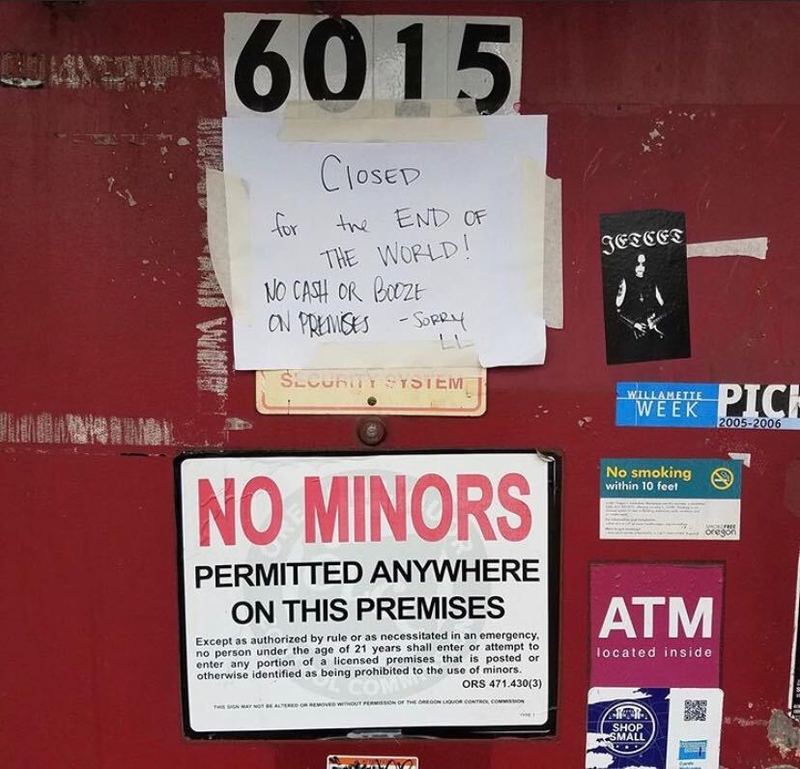 2020-03-27
2020-03-27Signs From Around: #9, Portland, OR
"Signs From Around: #9, Portland, OR" is part of a series exploring the signage surrounding COVID-19 from different parts of the world. Business owners give looters a heads up. #FordhamUniversity #VART3030 #SignsFromAroundSeries -
 2020-04-12
2020-04-12How things have changed so far
This is just a summary of how me and my family have adjusted to the new conditions created around Covid-19. -
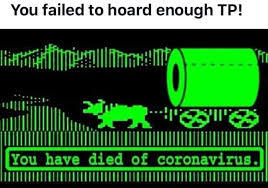 2020-04-04
2020-04-04Oregon Trail Toilet Paper Meme
This image tells the story of how a lot of people ran to the supermarket and started buying all the toilet paper as soon as the covid-19 epidemic hit. -
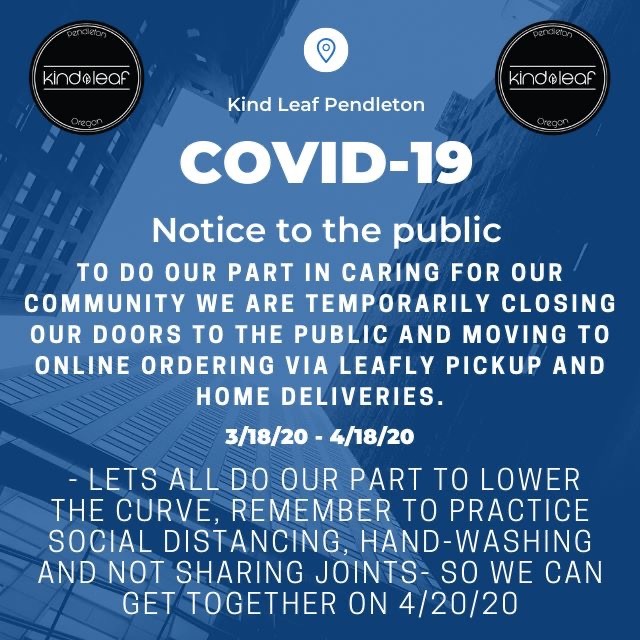 2020-03-19
2020-03-19Kind Leaf PENDLETON, first dispensary in Oregon to take steps to mitigate community spread.
This business sees 300-500 people a day, so the owner, Brandon Krenzler wanted to ensure that his staff and community would not be exposed unnecessarily. This customer notice was issued shortly after the mandatory shuttering of dining establishments and bars in Oregon by Governor Kate Brown.
